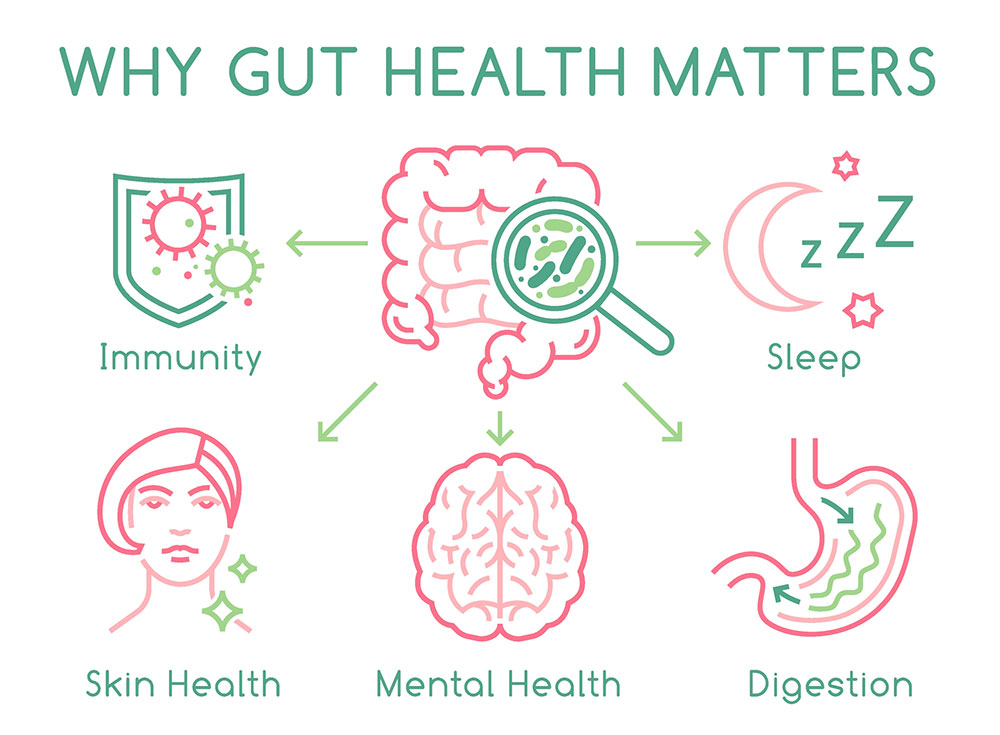LEARN WHAT TO EAT TO HAVE A HEALTHY MICROBIOME
Why Gut Health Matters
As a registered dietitian nutritionist, I have worked with innumerable individuals over the years who struggle with digestive/gastrointestinal problems (gut health) such as Irritable Bowel Syndrome, Inflammatory Bowel Disease (Crohn’s or colitis), Diarrhea, constipation, gas, and bloating, to name a few. The microbiota in our gut has a significant role in the development and progression, as well as remission and resolution, of chronic GI disease.
Before I explain what to eat, I want to be sure you understand what the microbiome is and why it is so important to have health promoting microbes: The microbiome is the collection of all the microbes (such as bacteria, fungi, viruses) that live in our bodies. Though most live in the small and large intestines, they exist throughout. The microbiome is referred to as an organ because it plays so many key roles in promoting the daily operations of the human body.
Just like a fingerprint, every person has their own unique microbiome. Some of these microbes promote health while others promote disease. When there is a disturbance in a healthful balance, it is called dysbiosis.
While some of the microorganisms are harmful to our health, others are incredibly beneficial and even necessary for good health. Since these microbes live deep within our bodies, we are their exclusive source of food. Every time you eat, you are your feeding these trillions of microbes. The question is whether you are feeding those that promote health or those that promote disease.
Can a dietitian help you develop a healthy microbiome?
Simply stated, microbes that promote health feast on fiber and variety. As a Registered Dietitian Nutritionist who specializes in gut health, I work with my patients to relieve symptoms while utilizing nutrition therapy to help resolve the disease/disorder or induce remission.
Focus on diet quality and your food pattern: A Mediterranean style pattern (real food, plant based, flexitarian) rather than a Western Plan (high in saturated fat and ultra-refined selections) is an example of a healthy plan.
What foods are best to attain and sustain a healthy microbiome?
Diversity:
Scientists have found that the more diverse your diet, the more diverse your gut microbiome. Studies show that a high level of microbiome diversity correlates with good health and that low diversity is linked to higher rates of weight gain and obesity, diabetes, rheumatoid arthritis and other chronic diseases.
Minimally Refined Selections:
Tim Spector, a professor of genetic epidemiology at King’s College London and founder of the British Gut Project spoke to the Washington Post. He says, “Eating a wide variety of fiber-rich plants and nutrient-dense foods seems to be especially beneficial. His work includes a crowd sourced effort to map thousands of individual microbiomes. He recommends that increasing the VARIETY of plant foods you eat each week is highly beneficial, even for those who already eat a lot of fruits and vegetables.
Healthy Fats:
Monounsaturated such as olive oil, nuts, avocado
Omega-3-fats, fish oil
Fermented Foods:
Yogurt, kimchi, sauerkraut, kombucha and kefir
What foods should be avoided if you want a healthy microbiome?
Ultra-refined selections:
These foods go through multiple mechanical processes which change their shape and form and may contain numerous added ingredients.
An undiversified diet:
One containing a limited variety of foods
A growing body of research suggests that these vast communities of microbes are the gateway to your health and well-being. Evidence shows that gut health is related to both your mental and physical health. The simplest and most powerful ways to shape and nurture them is through your diet.
RESOURCES:
Healthline, Signs of an Unhealthy Gut and What to Do About It
Washington Post, The Best Foods to Feed Your Gut Microbiome
Health Day, Could Artificial Sweeteners Alter Your Microbiome?



